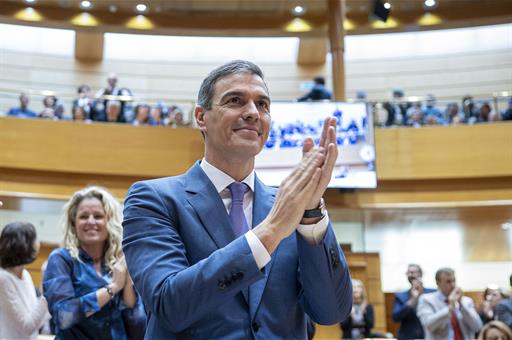The President of the Government of Spain says reform of Article 49 of the Constitution is a major step towards full inclusion
President's News - 2024.1.18
Upper House of Parliament, Madrid
The Plenary of the Lower House, in an extraordinary session held in the Upper House of Parliament, has approved the proposal to reform Article 49 of the Constitution by 312 votes in favour and the 32 votes against of the Vox ministers.
The Lower House will now send the text to the Upper House of Parliament for final approval. The amendment has been processed directly and in a single reading to speed up parliamentary deadlines, following the agreement reached between the President of the Government of Spain, Pedro Sánchez, and the leader of the opposition, Alberto Núñez Feijóo, to promote the reform.
The President spoke at the end of the plenary session to stress that today "is a great day for our democracy" because "a moral debt is being settled with more than 4 million fellow citizens". Moreover, he pointed out that this is the third reform of the Constitution, but the first with a clearly social content in 45 years and, in his opinion, it conveys an important message: "We all win when we are able to agree in the general interest".
The constitutional reform was promoted by the Spanish Committee of Representatives of Persons with Disabilities (CERMI) in 2018, whom the president thanked for their defence of this group.
The President of the Government of Spain, Pedro Sánchez, conveyed to them that changing a word is not changing reality, but "the political will was needed to do so". By eliminating the term 'handicapped' and adopting the term 'persons with disabilities', he said, we comply with the International Convention on the Rights of Persons with Disabilities and recognise something that "should be self-evident", that persons with disabilities "are, above all, people and as such, subjects of each and every right".
The head of the Executive added that it is legally recognised that disability does not prevent the full exercise of personal autonomy and that it is time to turn formal equality into real equality: "This must be an objective that challenges us and that concerns each and every one of the administrations, civil society and businesses.
"There is a long way to go to achieve full inclusion, to embrace the diversity that defines us, to make visible what for so long was painfully ignored. But today I think we are taking a big step in that direction," the president concluded.
Change in the wording of the Article
Currently, Article 49 of the Constitution is worded as follows: "The public authorities shall carry out a policy of foresight, treatment, rehabilitation and integration of the physically, sensorial and mentally handicapped, to whom they shall provide the specialised care they require and who shall be especially protected in order to enjoy the rights granted to all citizens by this Title".
With the proposed text, the article would read as follows: "Persons with disabilities exercise the rights provided for in this Title in conditions of real and effective freedom and equality. The special protection necessary for this exercise shall be regulated by law."
"The public authorities shall promote policies that guarantee the full personal autonomy and social inclusion of persons with disabilities in universally accessible environments. They shall also encourage the participation of their organisations, under the terms established by law. Particular attention will be paid to the specific needs of women and children with disabilities."
Non official translation





